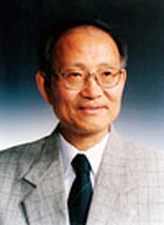Pinxian Wang

The 2007 Milutin Milanković Medal is awarded to Pinxian Wang for his outstanding contributions to the development of paleo-oceanography in the Western Pacific and its paleo-monsoon studies especially in the South China Sea.
Pinxian Wang is international acknowledged for his contributions to the development of paleoceanography and micropaleontology in the Western Pacific and paleo-monsoon studies in East Asia, especially in the South China Sea.
The first work that made Pinxian Wang known to the outside world was the volume “Marine Micropaleontology of China” published in 1985. The volume demonstrated the results of extensive investigations on microfossil distribution in the China Sea performed by his group in a few years after the “Cultural Revolution”, and helped to bridge the gap in marine geology between China and the world community. Pinxian Wang initiated paleoceanographic work in China and published the first paleoceanographic papers in the South China Sea by the end of the 1980es. His works revealed the amplifying effects of glacial signals in the Western Pacific marginal seas, and the role of Asian deformation in the global environmental changes.
Pinxian Wang is one of the leading paleoclimatologists in Asian monsoon studies, including its global linkages on Milankovitch and sub-Milankovitch time scales. He initiated, designed and co-led the Ocean Drilling Program Leg 184 to the South China Sea in 1999, engaged in East Asian monsoon history. Together with other cruises, the post-cruises works have mad the South China Sea the marine centre of East Asian paleomonsoon studies, and he has been playing a crucial role in both the onboard and onshore work. He not only contributed to a wide spectrum of monsoon studies, ranging from the monsoon inception and its variations, but was also the leader of the SCOR/IMAGES Working Group on Paleo-Asian monsoon that reviewed the current status and outstanding issues in the field and put forward recommendations for further researches. Based on the South China Sea records and a global comparison, Pinxian Wang discovered three major stages in the Quaternary oceanic reservoir changes and their presumed interactions with the ice-sheet changes, showing the global impact of the monsoon response to the long-eccentricity orbital forcing.
Along with the research achievements, Pinxian Wang’s contribution to science involves also organizational activities, particularly in promoting marine paleoenvironmental studies and exchanges in Asia. In 1988, he convened the First Asian Marine Geology Conference in Shanghai, followed by 4 successive conferences held in various Asian countries. As leader of the UNESCO/IOC Working Group, he organized the compilation of late Quaternary paleogeographic maps for the Western Pacific marginal seas. He gave a great impetus to the Chinese participation in ODP/IOCP and was the central figure in promoting China’s involvement in international deep-sea programs. Another success of Pinxian Wang is the growth of active young paleoceanographers in China and the laboratory in Shanghai which will host the 9th International Conference on Paleoceanography in 2007.
